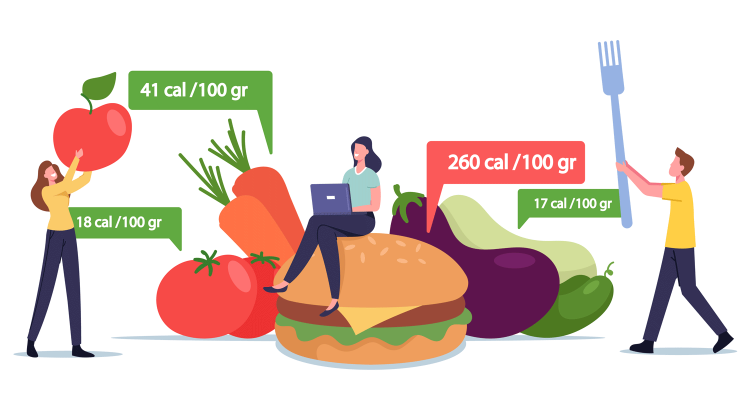The Calorie Density Calculator is a valuable resource for individuals looking to monitor their calorie intake and establish healthy eating habits. When used alongside calorie counting and nutrient tracking, this tool can help achieve optimal results.
Calorie density refers to the number of calories in a given volume or weight of food, with low-calorie-density foods often being rich in fiber and water. To use the Calculator, you’ll need two inputs: calories per serving (kcal/serving) and the total weight of the serving (g).
Armed with this information, you can easily determine the number of calories per pound of food, making it an effective tool for managing portion sizes.
Result:
Now, let’s dive deeper into calorie density, its benefits, and its applications in weight loss and management, as well as other tips for making healthier food choices. Remember to write in English.
How To Use Calorie Density Calculator
Using the Calorie Density Calculator is straightforward; you simply need two inputs – calories per serving (kcal/serving) and the total weight of the serving (g). With this information, you can calculate the number of calories per pound of a given food.
The Formula and Process for Calculating Calorie Density
Calorie density, which refers to the number of calories per unit of volume or weight of food, is a crucial aspect of weight management. To ensure you’re making the healthiest choices for your lifestyle, the Calorie Density Calculator can help you determine the calorie density of various foods.
Level Up Your Fitness: Join our 💪 strong community in Fitness Volt Newsletter. Get daily inspiration, expert-backed workouts, nutrition tips, the latest in strength sports, and the support you need to reach your goals. Subscribe for free!
Caloric Density = Calories per Serving / Serving Size
For example, if a serving contains 100 kcal and weighs 250 grams, then its Calorie Density would be calculated as follows: 400 kcal/kg = 0.4 kcal/g.
Tips For Interpreting Results and Its Limitations
- While the Calorie Density Calculator is a helpful tool to calculate the calories in a specific amount of food, it’s essential to consider individual factors when interpreting results.
- People have different metabolic rates and body compositions, so calorie density should be tailored to each person’s unique needs.
- Serving sizes can also impact the accuracy of the calculation, particularly in meals with numerous ingredients or multiple servings of one item.
- Food preparation methods, such as baking, boiling, or frying, can influence the calories consumed per portion.
- To get a comprehensive view of your diet, use the calculator alongside other tracking methods, such as logging meals and monitoring portion sizes.
- Consult a healthcare professional or dietitian for personalized nutritional guidance based on your weight goals and health history.
Understanding Calorie Density
Calorie density is a crucial factor in managing weight, as it involves determining the calorie content within a specific amount of food.
Defining Calorie Density and Its Importance in Weight Management
Calorie density refers to the number of calories per unit weight or volume of food. Evaluating foods based on their calorie density can help guide people in making informed meal and snack choices.
High-calorie, low-nutrient foods typically have a high calorie density, while nutrient-rich, lower-calorie options have a lower calorie density. Effective weight management involves understanding how different foods impact overall caloric intake and how to balance higher caloric intakes with other portions or sources throughout the day.
Managing one’s diet successfully entails mastering portion control and being aware of individual goals related to macronutrients such as carbohydrates, proteins, and fats.
A Calorie Density Calculator can assist in tracking these details, enabling individuals to better determine what works best in their diets based on personal preferences and lifestyle needs.
In fact, studies suggest that choosing healthier items with low-calorie densities, such as fresh fruits, vegetables, whole grains, and lean proteins, promotes feelings of fullness, preventing overeating throughout the day. This ultimately reduces the likelihood of returning to unhealthy habits due to excessive eating. This scientific evidence highlights why monitoring calorie density matters not only for our physical well-being but also for maintaining good mental health.
Level Up Your Fitness: Join our 💪 strong community in Fitness Volt Newsletter. Get daily inspiration, expert-backed workouts, nutrition tips, the latest in strength sports, and the support you need to reach your goals. Subscribe for free!
The Relationship Between Calorie Density And Weight Management
Calorie density plays a significant role in weight management and overall caloric intake. The number of calories in a standard serving size offers insight into the energy provided by a food item, which can help you plan and maintain healthy eating habits in the long term.
By understanding and monitoring calorie density, you can make informed decisions about the foods that best support your health goals. Low-calorie density foods often contain high amounts of fiber and water, promoting feelings of fullness and satisfaction with fewer total calories consumed.
Examples of such foods include lean proteins like chicken breast and plant-based items like broccoli, both of which provide around 100 calories per pound. This makes it easier to manage calorie consumption while still feeling satisfied after meals.
Conversely, higher calorie density foods, such as bagels, contain more than 1,200 calories per pound. Consuming these foods can lead to the intake of hundreds of additional empty calories without providing significant bulk or nutritional value. This should be a concern for those attempting to maintain a healthy diet.
Advantages of Monitoring Calorie Density
Using a Calorie Density Calculator offers several benefits for weight management and healthier eating. By tracking calorie density, individuals can monitor the number of calories in their food and assess other key components such as fat, carbohydrates, fiber, and protein content. This empowers users to make smarter food choices and manage portion sizes, helping them reach their health goals more efficiently and identify areas for improvement when necessary. Here are several advantages of tracking your daily intake through a Calorie Density Calculator:
- Identifies High-Calorie Foods: By calculating calorie density, users can more easily identify foods that are high in calories per pound or volume. During challenging weight loss periods, these high-calorie options can be replaced with lower-calorie alternatives to keep caloric intake under control.
- Portion Control: Using a Calorie Density Calculator allows you to determine an accurate serving size based on your weight goal or caloric needs. This ensures that meals are both healthy and calorically appropriate while still providing satisfaction after mealtime.
- Planning Healthy Meals: A Calorie Density Calculator can help plan days or weeks’ worth of meals based on specific dietary requirements with greater precision. You can set macro or nutrient goals on a meal-by-meal basis for more targeted planning.
- Food Choices: Understanding the calorie density of different foods simplifies shopping, as you can prioritize low-calorie density options when making selections at grocery stores or restaurants while avoiding higher-calorie options like processed food and fried items. Moreover, it enables you to recognize nutrient-dense food sources, allowing you to fuel your body with essential vitamins and minerals without exceeding your calorie limit.
Applications of a Calorie Density Calculator
A Calorie Density Calculator can help monitor progress towards weight loss and other health goals, identify high and low calorie density foods, plan healthier meals based on calories per pound of food items, and guide portion control by tracking energy consumed.
Weight Loss and Weight Management
Monitoring calorie density is essential for weight management. A Calorie Density Calculator calculates the calories in a pound of a given food, helping individuals make informed decisions about their diet and overall health goals. This tool, alongside calorie counting and nutrient tracking, can help achieve optimal results for managing body weight.
Choosing Healthier Food Options and Portion Control
Calorie density refers to the calories in a unit of food per weight or volume. Understanding the calorie density of different foods can help with portion control, leading to healthier eating habits and improved fitness goals. To use a Calorie Density Calculator effectively:
- Calculate your daily caloric requirement using our online calculator.
- Determine what percentage of your total caloric intake should consist of each macronutrient.
- Review the ‘Nutrition Facts Panel’ on food packages and calculate your calorie intake.
- Use a Calorie Density Calculator to identify low-calorie dense foods.
- Compare various foods across their nutrition facts.
Planning Healthier Meals
A Calorie Density Calculator helps individuals plan healthier meals and set realistic nutrition goals. It calculates the total calorie content of foods according to their weight and estimated calories per serving size, helping users to make informed food choices based on calorie values.
Identifying High and Low Calorie Density Foods
Identifying high and low Calorie Density foods helps individuals better regulate their calorie consumption, eat more nutrient-dense diets, and make healthier food choices. Foods with lower calorie density are sources of micronutrients due to their higher fiber and water content, helping individuals stay full for longer periods on fewer calories.
FAQs
What is a calorie density calculator?
A calorie density calculator is a tool that helps with weight management by calculating the number of calories per unit weight of food consumed. This can help individuals more accurately monitor their daily food intake when trying to lose or maintain weight.
How accurate are calorie density calculators?
Our calorie density calculators quite accurate, provided users input up-to-date nutritional data for the foods being consumed. However, if an individual inputs outdated information from old nutrition labels, this may lead to inaccuracies in the calculations.
Conclusion And Additional Resources
The Calorie Density Calculator is a valuable tool for individuals seeking to manage their weight and make healthier food choices. By understanding the calorie density of various foods, individuals can effectively manage portion control, select nutrient-dense options, and plan healthier meals.
Although the calculator provides a solid foundation for tracking calorie intake, it is essential to consider other factors such as individual metabolic rates, body compositions, serving sizes, and food preparation methods when interpreting results.
Combining the use of a Calorie Density Calculator with regular tracking of food intake, consulting with healthcare professionals or dietitians, and staying informed about nutritional data can significantly contribute to achieving and maintaining optimal health and weight management goals.














